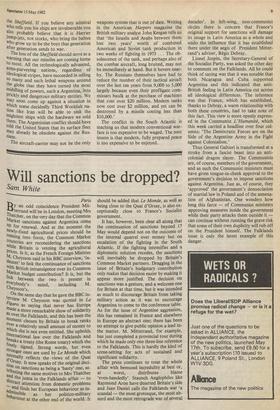Will sanctions be dropped?
Sam White
Paris BY an odd coincidence President Mit- terrand will be in London, meeting Mrs Thatcher, on the very day that the Common Market sanctions against Argentina come UP for renewal. And at the moment the newlY-fixed agricultural prices should be coming into force, the Common Market Countries are reconsidering the sanctions While Britain is vetoing the agricultural Prices. Is it, as the French Foreign Minister M. Cheysson said in his BBC interview, 'in- decent' to link the continuance of sanctions with British intransigence over its Common Market budget contribution? It is, but the link between the two is present in everybody's mind, including M. Cheysson' s . On the same day that he gave the BBC in- terview M. Cheysson was quoted in Le Figaro as saying that never has Europe Made a more remarkable show of solidarity as over the Falklands, and this has been the Moment chosen by Britain to break ranks over a relatively small amount of money to Which she is not even entitled. She upholds international law over the Falklands and freaks a treaty (the Rome treaty) which she reely signed. Strong words, but even stronger ones are used by Le Monde which cin°,,,flially reflects the views of the Quai "-irsaY. It now speaks of the original deci- sion on sanctions as being a 'hasty' one, at- tributing the same motives to Mrs Thatcher and the junta in the Falklands affair — to distract attention from domestic problems and finds her European behaviour as in- admissible as her politico-military behaviour at the other end of the world. It should be added that Le Monde, as well as being close to the Quai d'Orsay, is also ex- ceptionally close to France's Socialist government.
It has, however, been clear all along that the continuation of sanctions beyond 17 May would depend not on the outcome of the internal quarrel over money but on escalation of the fighting in the South Atlantic. If the fighting intensifies and a diplomatic solution recedes, the sanctions will inevitably be dropped by Britain's Common Market partners. Dragging in the issue of Britain's budgetary contribution only makes that decision easier by making it appear more justified. The decision on sanctions was a gesture, and a welcome one for Britain at that time, but it was intended as much to discourage Britain from taking military action as it was to encourage Argentina to come to the conference table. As for the issue of Argentine aggression, this has remained in France and elsewhere in Europe an abstract one; there has been no attempt to give public opinion a lead in- the matter. M. Mitterrand, for example, has just completed a provincial tour during which he made only one three-line reference to the Falklands. This is hardly the kind of scene-setting for acts of sustained and significant solidarity.
The press continues to treat the whole affair with bemused incredulity at best or, at worst, distributes blame 'even-handedly'. Staunch Anglophiles like Raymond Aron have deserted Britain's side and Jean Daniel calls the Falklands war 'a scandal — the most grotesque, the most ab- surd and the most retrograde war of several decades'. In left-wing,. non-communist circles there is concern that France's original support for sanctions will damage its image in Latin America as a whole and undo the influence that it has established there under the aegis of President Mitter- rand's adviser, Regis Debray.
Lionel Jospin, the Secretary-General of the Socialist Party, was asked the other day to comment on the Falklands. All he could think of saying was that it was notable that both Nicaragua and Cuba supported Argentina and this indicated that anti- British feeling in Latin America cut across all ideological differences. The inference was that France, which has established, thanks to Debray, a warm relationship with both these countries, had to take note of this fact. This view is more openly express- ed in the Communist L'Humanite, which this week carried a headline over four col- umns: 'The Democratic Forces are on the Side of the Argentine Army in the Fight against Colonialism.'
Thus General Galtieri is transformed at a stroke from a fascist beast into an anti- colonial dragon slayer. The Communists are, of course, members of the government, and as such the Communist ministers must have given tongue-in-cheek approval to the government's decision to impose sanctions against Argentina. Just as, of course, they 'approved' the government's denunciation of martial law in Poland and of the annexa- tion of Afghanistan. One wonders how long this farce — of Communist ministers approving measures inside the government while their party attacks them outside it can continue without running the grave risk that some of their own duplicity will rub off on the President himself. The Falklands issue is only the latest example of this danger.






































 Previous page
Previous page